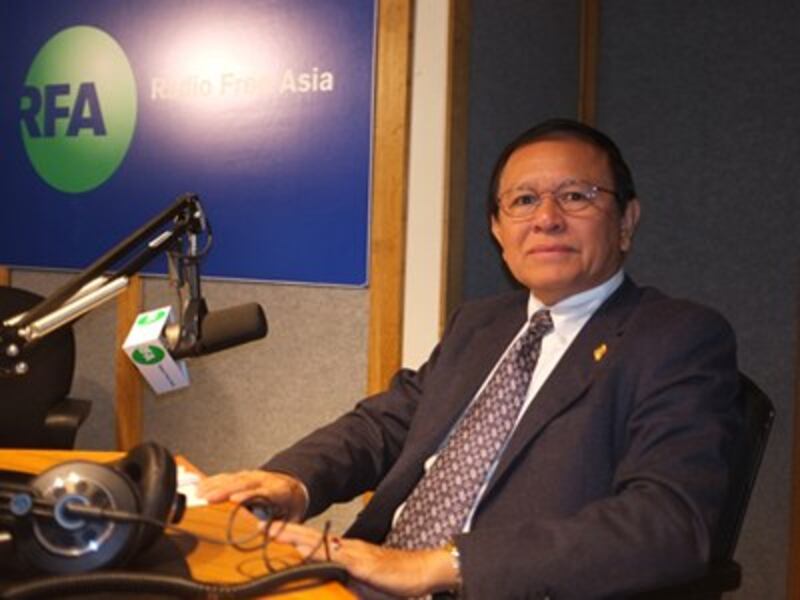Cambodia’s parliament unanimously approved two controversial election related laws on Thursday, heavily criticized by NGOs because of their restrictive provisions and curbs on freedom of speech during campaigns, prompting an opposition politician to vow to address those concerns.
Sam Rainsy, leader of the opposition Cambodia National Rescue Party (CNRP), said he and other CNRP members were not totally satisfied with the laws, which NGOs say will create a more restrictive election environment.
“The CNRP is waiting to amend the laws to resolve what the NGOs don’t like,” he told RFA’s Khmer Service.
“We are working to find solutions when we have a chance in order to ease their concerns. We are working to ensure people and NGOs have 100 percent freedom of expression without concerns, but under the current situation, we are accepting the draft laws for now.”
The 103 lawmakers from the ruling Cambodian People’s Party (CPP) and opposition CNRP who were present during the session did not debate the laws before approving them.
They had worked on drafting the laws following a political deal last July that included electoral reforms and a new body to oversee the country’s polls, which ended the CNRP’s 10-month boycott of parliament.
One law establishes a new National Electoral Committee, the body that oversees polls in the country, with nine members—four from each party and a neutral one.
The other one amends the current election law. However, it contains provisions stipulating that local and international NGOs operating in Cambodia must remain neutral in elections and forbids them from participating in political campaigns.
It also forbids them from distributing election materials, issuing statements supporting political parties, showing a bias against a party or candidate, and issuing written statements or giving media interviews to express support for parties and candidates.
Last week, representatives from more than 60 NGOs and an electoral reform group boycotted a national workshop held by the two parties on the electoral reform draft law, saying they did not have enough time to review the documents before the session.

Both parties made concessions
Sam Rainsy said both parties had to make concessions regarding the legislation, but he was “working step by step to honor the NGOs’ request in the future.”
Speaking during a call-in show from RFA’s headquarters in Washington on Thursday, Kem Sokha, CNRP vice president and National Assembly vice president, said his party had discussed the NGOs’ concerns with the CPP, but did not get 100 percent of what it wanted.
“Sam Rainsy and I have said that when we negotiate, we can’t get 100 percent,” he said. “We are concerned about freedom of expression, so we have bargained, but we couldn’t succeed.”
Prior to the vote, Sam Rainsy expressed his support for the legislation in a speech before lawmakers and urged them to avoid debate.
“The National Assembly doesn’t need to debate in detail because the two parties’ working teams have worked very hard on the details for six to seven months,” he said. “We have already improved the draft laws.”
He also said he appreciated the “culture of dialogue” between the two parties that led to the passage of the laws.
“We are using the culture of dialogue to replace the culture of war,” he said. “We must maintain peace.”
Back-door exit
Prime Minister Hun Sen, who marked 30 years in office earlier this year, did not give a speech after the vote and left the National Assembly building through a back door.
Speaking at a graduation ceremony prior to the session, Hun Sen repeated an earlier threat he had made against Kem Sokha, saying authorities would arrest him if he led a protest against the CPP government to demand release of jailed opposition party activists.
The activists were arrested during an antigovernment protest last July after CNRP supporters clashed with security guards in the capital Phnom Penh.
Hun Sen also repeated his assertion that Kem Sokha was spearheading a plot to overthrow his government, despite the opposition politician’s denial, and said CPP lawmakers would vote to remove him from his position as vice president of the National Assembly.
Despite the threats, Kem Sokha said he would return to Phnom Penh on March 23.
Sam Rainsy refused to comment on Hun Sen’s threats against Kem Sokha.
Reported by RFA’s Khmer Service. Translated by Samean Yun. Written in English by Roseanne Gerin.
